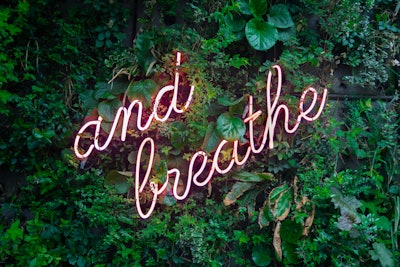
There are signs and symptoms of burnout, which is often defined as a state of physical, emotional, and mental exhaustion caused by prolonged stress. The Mayo Clinic cites changes in sleep, difficulty in concentration, and a lack of satisfaction from your achievements, among others.
Event profs are especially prone to burnout—according to the ones we recently spoke to—by the nature of the high-stress, high-octane job. "There have been many times where I've gotten sick several times in a row because I am putting myself, my body, and my health (mental and physical) last," says Carrie (Abernathy) Davenport, founder of the Association for Women in Events and lead meeting planner for Altria.
"We all go through [it] when juggling multiple tasks—parenting, work, travel," adds Rachael Riggs, general manager of environmental strategy at Maritz Global Events (she also works with clients to develop well-being programming). "A year ago, I was trying to battle too much, and I just got too overwhelmed and took a step back and started really looking at what I'm doing personally and professionally."
Rachel Sheerin, a keynote speaker and emcee who often focuses on healing from burnout, went through something similar. "The reason I'm called and compelled to talk about burnout is because I don't want anyone to lose their friends, their identity, their work, their income, their calling like I did," she says. Another sign of burnout she advises to look out for? "When you're burnt out, the thing that I [think is the biggest sign] is that all of a sudden, when it really starts to hit home, you start showing up like somebody you're not super proud of."
And although "the pandemic was pivotal in making us really aware of our own well-being," Riggs says, she questions whether event profs are giving themselves the room to address it. "I do think it has some room for growth," she says when asked about if topics like self-care and burnout are talked about enough in the industry. "I do think it has improved exponentially. I think people are in tune with it, but my question is: Are we really acting on it?"
To help move the needle, we've rounded up tips and insights from Riggs, Davenport, Sheerin, and other event profs on how to handle (and even prevent) burnout.
1. Give yourself grace.
"My biggest tip to people when they're feeling burned out is just to give yourself the time, the grace, and the space to get yourself back up," Riggs advises.
But as hospitality professionals, in can be difficult to turn that grace inward. "You spend your life serving other people, and when it comes time to serve yourself, sometimes it can be extreme whiplash," Sheerin says.
It might sound oversimplified, but these event profs agree that if you've felt you've hit the point of burnout, know that the path out of it could be an opportunity.
"I've always been proud of my work and myself, but when I stopped being constantly disappointed in myself I started to feel a change," Davenport explains. "My motto for several years now has been progress over perfection. I know I am going to hit burnout a couple times per year with how my type-A brain works. After I hit burnout, instead of using it as a chance to berate myself or my body for failing, I look at it as an opportunity to rise anew—to rebuild, to rebrand, to refocus. I challenge myself to come out stronger, different. Again, the mind is a powerful thing, and if we are able to re-shift our perspective to see burnout as an opportunity, then you've hit the jackpot."
2. Unplug when you can.
All event profs have no doubt felt the pull to their devices, whether it's to check the inbox, shoot off that quick text before you forget, or answer the call no matter the time of day. But setting boundaries when it comes to your work communications can be pivotal in avoiding burnout.
"It can be difficult not to try and catch up at night, but I try to schedule my emails to at least go out in the morning at office hours so other’s don’t feel the pressure of the 'ping' from their email," says Mackenzie Drehoff, events manager for the American Society of Travel Advisors. "In regards to that too, turn your emails and Teams notifications off when you are offline too, especially during those slower seasons of time. It’s so tempting to check in on things, but everyone needs to recharge their batteries in order to have a clear head the next day."
It's also beneficial to find pockets of time dedicated only to yourself. Manicure or pedicure, anyone?
"It forces me to sit down for an hour and a half, [and] I can’t use my hands while I’m soaking off my gel mani (so no phone)," says Racquel Guyton, principal designer of St. Germain Design & Co. "I can’t walk outside to use the phone while getting a pedi, and I feel like there is an unspoken rule in salons where we need to maintain the quietness while patronizing. I am forced to sit. I am forced to be still. I am forced to be quiet. It’s so necessary."
Davenport cites navigating airports and flying as her time to unplug.
"As a busy—and often traveling—event professional, I have to find fleeting moments," she explains. "For me personally, my flight time is me time only. I don't open a laptop. I don't answer work emails unless urgent. I try to listen to a podcast, a meditation, or catch up on rest. I spoil myself a little in airports. Any time you can carve out to make it special, you should. Ritual is important."
3. Switch up your office environment.
Whether you go into an office or work from home (or some combination of both), these event profs were eager to share ways to switch up your working environment—and why that can help stave off stress.
"Last year, I invested in a sit/stand desk and a walking mat," says Leslie Weekes, a conference and event manager based in New York. "I did it to stay fit, but I've discovered that walking while working relieves a lot of tension. I'm even finding it difficult to become stressed."
Riggs agrees that finding any way to incorporate movement, and even the outdoors, can be stress relieving. "Try to do a walk-and-talk meeting," she says. "Getting some fresh air or that 10 minutes of vitamin D on your skin, if you can, is very helpful."
Don't forget simple things too, Riggs adds, like making sure you schedule breaks in between meetings.
"As silly as it sounds, it's very practical," she says. "Make meetings 25 minutes instead of 30 minutes so people have a break to breathe between. There's a way to set up this up in Outlook in your organization so that when you automatically hit 'schedule a meeting,' it can automatically populate to 25 minutes, not 30 minutes. I mean, think about how many times you have been back to back to back—and you didn't even have time to get a drink of water."
When Davenport feels herself close to burnout, she likes to take a mental self-assessment day: "What am I doing each day? Are those things bringing me joy in the same way they used to? What can be moved or shifted off my plate? Then I start a list, small to large and snowball tackle. I start with the very smallest task and give myself the grace to only complete one or two that day. If I need a day off, I use it instead of staring at the screen mindlessly begging myself to get motivated. If you don't have that luxury (as many of us don't), then putting a walk on your calendar and making yourself move often helps more than you would think it would."
4. Be stricter with your boundaries.
Back to boundaries. Maybe you're setting them, but are you following them? Riggs has observed that there can be a generational gap here when it comes to the corporate world.
"At Maritz, we started this [well-being practice] back in 2018, because I was observing the behaviors of the younger generations and the older generations at an industry conference," she explains. "And one of the things that I really noticed is that the younger generation is really disciplined on some of their boundaries on their personal care."
Boundaries for yourself are important, but so are boundaries for your internal team.
"In this job we do have to understand that there are always busy seasons, especially leading up to an event," Drehoff says. "I think it’s important to set some boundaries when you can, not just personally but for those on your team as well. Our team really encourages to actually use your PTO and not just let it build up. When you are off the grid, stay off the grid, and pass your email to someone who can manage it properly."
Riggs adds that setting the tone for your team is important—that's it's OK to take time off and give yourself time to recharge. "If they're burning the candle at both ends, you know they're going to shoot an email at six o'clock on a Friday, and the person is going to react that's receiving it. So be mindful of the culture that you're creating within your environment. Use that 'send later' button."
5. Know when a bigger reassessment is needed.
When Davenport hit the biggest burnout of her career, she was running a top 100 trade show in the country and sleeping under her desk to get everything done.
"My relationships and work suffered greatly," she remembers. "No amount of walking or mindshift was going to help change a toxic environment. The point is to know when you are facing burnout, and know when the environment you are in is so toxic that you cannot possibly rework your mind, body, or soul to change your situation. In those moments, a bigger shift, a reassessment of career or current role has to take place."
Drehoff adds: "This job comes with a lot of pressure and crazy deadlines. It’s normal to feel anxious, but if you feel like anxiety is affecting your day-to-day life, [there's] no shame in speaking with a counselor to help navigate."
Editor's note: Some of these comments were shared by readers on our social media networks. Join our discussions on LinkedIn, Twitter, and Facebook.
Other resources for event profs:
- Let’s Keep It Real about Wellbeing in the Workplace | Webinar, Feb. 16, Events Industry Council
- Resources for Workforce and Wellness | Guidebook, Events Industry Council
- How to Burnout and Be Successful | Keynote, Rachel Sheerin for TEDx



















